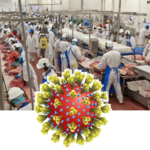The concerns about the integrity of the meat supply are increasing as more meat plants are forced to close due to COVID-19. Three of the largest pork processors in the US had closed indefinitely. The 3 plants account for approximately 15% of US pork production. The plant closures and production reductions decrease the national pork production by 25% and beef production by 10%. President Trump has, by an Executive Order, placed the American meat industry under the Defense Production Act (DPA) to prevent meat shortages. The order would designate meat processing plants as essential infrastructure, thereby keeping them open despite...
ruth
The Coronavirus pandemic had impacted meat processing plants, warehouses, and grocery stores, where increasing numbers of workers are getting sick with the Coronavirus. In meat processing plants, workers typically stand elbow-to-elbow to carry out the cutting, deboning, and packing of chicken and beef. Plants processing beef and chickens have closed to slow the virus spread among employees. Across the country, major meat processors are starting to shut down plants as employees are getting infected by the Coronavirus. Meat and poultry plant closing due to the Coronavirus expose the vulnerability of global food supply chains that are needed to keep grocers’...
ruth
The Coronavirus outbreak called COVID19 killed over 2,000 people (all but 6, in China) and had infected more than 75,000 people. COVID19 is not transmitted through food; the virus needs a host (animal or human) to grow. The most impact of the Coronavirus on food supply and safety is obviously in China with the food sector hit the hardest. China’s factory output, consumer spending, tourism, and commodity prices have seen significant drops. Closed factories and involuntarily idled workers have reduced production and limited product supplies. Restrictions on moving livestock have paralyzed the supply chains of poultry and eggs, leaving farmers...
ruth
In its second annual report published by the US PIRG Education Fund, the authors Karthikeyan & Garber looked at recall trends since the implementation of FSMA. The research showed a significant increase in USDA regulated number of recalls from 2013 to 2017. Recalls due to the most hazardous Class 1 meat and poultry increased by 83%, while the overall recall increased by 67%. Beef recalls increased by 55%, pork by 67%, and poultry recalls increased the most at 70% from 2013 to 2018. In contrast the recalls of produce and processed food increased only by 2% since 2013. The data...




